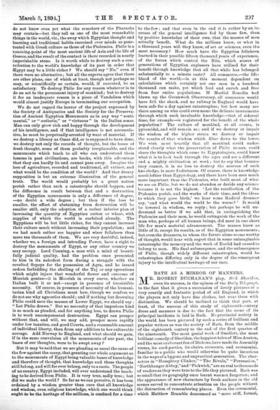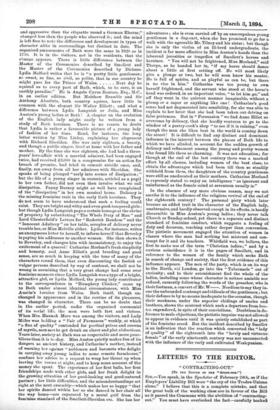BATH AS A MIRROR OF MANNERS.
NIR. ROBERT BITCHANAN'S play, Dick Sheridan. owes its success, in the opinon of the Daily Telegraph, to the fact that it gives a succession of lovely pictures of a very courtly and fantastic period of old England, in which the players not only have fine clothes, but wear them with distinction. We should be inclined to think that part, at least, of the success of this study of eighteenth-century dress and manners is due to the fact that the scene of its principal incidents is laid in Bath. No provincial society in the world has been pictured by such a series of brilliant and popular writers as was the society of Bath, from the middle of the eighteenth century to the end of the first quarter of the nineteenth. The most genial work of Smollett, the most brilliant comedy of Sheridan, the happiest tales of Miss Austen, and the most exuberant fan of Dickens, have made its Assembly rooms, its card-parties, its chairs, crescents, and ceremonial, familiar to a public itho would otherwise be quite incurious in the ways of a bygone and unpractical generation. The char- acters in "Humphrey Clinker," "The Rivals," "Persuasion," "Northhanger Abbey," and "Pickwick," are as real to thousands of readers as they were true to the life they pictured. Bath was so small that its geography once learnt was not forgotten; and the appearance of new characters by fresh authors in the old scenes served to concentrate attention on the people without the distraction of remembering places. Even the ceremonial, which Matthew Bramble denounced as "more stiff, formal,
and oppressive than the etiquette round a German Elector," changed less than the people who observed it; and the mind is left free to note the difference and development in types of character alike in surroundings but distinct in date. The organised amusements of Bath were the same in 1820 as in 1750. It is in the visitors, not in the residents, that the change appears. There is little difference between the Master of the Ceremonies described by Smollett and the Master of the Ceremonies described by Dickens. Lydia Melford writes that he is "a pretty little gentleman; so sweet, so fine, so civil, so polite, that in our country he
might pass for the Prince of Wales Next day he squired us to every part of Bath, which, to be sure, is an earthly paradise." He is Angelo Cyrus Bantam, Esq., M.C., in an earlier edition. But Matthew Bramble and Sir Anthony Absolute, both country squires, have little in common with the elegant Sir Walter Elliott ; and what a difference between Lydia Languish or Julia, and Miss Austen's young ladies at Bath ! A chapter on the evolution of the English lady might easily be written from a study of Bath heroines. There is no reason to doubt that Lydia is rather a favourable picture of a young lady of fashion of her time. Read, for instance, the long letter written by Miss Linley, explaining her elopement with Richard Sheridan. She was only eighteen, a beauty, and though a public singer, lived at home with her father and mother. By the time she was eighteen, she had had a three- years' love-affair with a married admirer, bad been engaged twice, had received £3,000 in a compromise for an action for breach of promise, had tried to commit suicide once, and, finally, ran away from all her admirers with Sheridan. She speaks of being plunged "early into scenes of dissipation ; " but the life of a young singer in oratorio, articled as a pupil to her own father, did not even then involve what we call dissipation. Fanny Burney might as well have complained of the " dissipation " in her own musical home. Delicacy is the missing feminine trait in the early Bath heroines. They do not seem to have understood that such a feeling could exist. They are bright and witty and even good-tempered girls; but though Lydia Languish pays a certain homage at the shrine of propriety by substituting "The Whole Duty of Man" and Lord Chesterfield's Letters for "Roderick Random" and the "Innocent Adultery" on her table, scruples of delicacy never trouble her, or Miss Melville either. Lydia, for instance, writes an anonymous letter to herself, to inform herself that Beverley is paying his addresses to another woman. She then shows it to Beverley, and charges him with inconsistency, to enjoy the excitement of a quarrel ! Catharine Morland's fresh simplicity and honesty, and Anne Elliot's good breeding and good sense, are so much in keeping with the tone of many of the characters round them, that even discounting the foolish or vulgar persons described by way of contrast, we shall not he wrong in surmising that a very great change had come over feminine manners since Lydia Languish was a type of a bright, attractive girl, or Lydia Melford, the young lady contributor to the correspondence in "Humphrey Clinker," came up to Bath under almost identical circumstances, with Miss Austin's heroine from Wales. Bath itself, though un- changed in appearance and in the routine of its pleasures, was changed in character. There can be no doubt that in the earlier period, under the organised ceremonial of its social life, the men were both fast and vicious. When Mrs. Hannah More was among the visitors, and Lady Miller was holding a "Fair of Parnassus" weekly, at which "a flux of quality" contended for poetical prizes and crowns of myrtle, men met to get drunk on claret and plot abductions. Years later, society at Bath was as respectable and more punc- tilious than it is tc-clay. Miss Austen quietly makes fun of its dangers as ancient history, and Catharine's mother, instead of warning her against "noblemen and baronets who delight in carrying away young ladies to some remote farmhouse," confines her advice to a request to wrap her throat up when leaving the rooms at night, and to keep some account of the money she spent. The experience of her first balls, her first friendships made with other girls, and her frank delight in the growing attention of her good-looking and good-natured partner ; her little difficulties, and the misunderstandings set right at the next assembly—which makes her so happy "that her spirits danced within her as she danced in her chair all the way home—are separated by a moral gulf from the feminine standard of the Smollett-Sheridan era. She has her
adventures ; she is even carried off by an unscrupulous young gentleman in a dog-cart, when she has promised to go for a. walk with the agreeable Mr. Tilney and his sister; but though she is only the victim of an ill-bred undergraduate, the incident is far more effective in Miss Austen's hands than the laboured jocosities or tragedies of Smollett's heroes and. heroines. "You will not be frightened, Miss Morland," said Thorpe, as he handed her in, "if my horse should dance about a little at first setting off. He will most likely give a plunge or two, but he will soon know his master.. He is full of spirits, and as playful as can be, but there is no vice in him." Catharine was too young to own herself frightened, and the servant who stood at the horse's. head was ordered, in an important voice, "to let him go," an& off they went in the quietest manner imaginable, without a plump or a caper or anything like one ! Catharine's good sense had not degenerated into sensibility, for she was able to- explain to her lover that she had been taken out driving on false pretences. But in "Persuasion "we find Anne Elliot se overcome by delicacy, that she hardly ventures to go to the window of a pastry-cook's shop "to see if it is raining," even though the man she likes best in the world is coming down the street! It is difficult to find any distinct and dominant influence in the interval between the phases of Bath life to which we have alluded, to account for the sudden growth of delicacy and refinement among the young and pretty women who found life there so charming. It was not education; for- though at the end of the last century there was a marked effort by all classes, including women of the best class, to- obtain the advantages which had been till then so steadily withheld from them, the daughters of the country gentleman, were still as uneducated as their mothers. Catharine Morland is expressly stated to enjoy an intelligence "as ignorant and' uninformed as the female mind at seventeen usually is."
In the absence of any more obvious reason, may we not- ascribe it to the influence of the religious revival of the end of the eighteenth century? The personal piety which later' became an added trait in the character of the English lady,. unobtrusive, and hardly observed except in its effects, is hardly discernible in Miss Austen's young ladies ; they never talk Church or Sunday-school, yet there is a separate and distinct standard of feminine conduct, which suggests a feeling or duty and decorum, reaching rather deeper than convention. The pietistic movement engaged the attention of women in classes where the men had nothing but mistrust and con- tempt for it and its teachers. Whitfield was, we believe, the first to make use of the term "Christian ladies ; " and by a curious coincidence it is in the pages of Smollett, and in reference to the women of the family which seeks Bath in search of change and society, that the first evidence of this influence appears. The men of the party, which is on its way to the North, vid London, go into the " Tabernacle " out of curiosity; and to their astonishment find the whole of the- ladies, including some whose character is neither amiable nor refined, earnestly following the words of the preacher, who is. their footman, a convert of Mr. W—. Needless to say they in- cur the unbounded contempt and ridicule of the gentlemen; but their defence is by no means inadequate to the occasion, though. their meekness, under the superior chidings of uncles and' brothers, shows the mistrust which such a departure from bon- ton engendered, in spite of their convictions. Doubtless in de- ference to male objections, the pietistic impulse was not allowed to appear in evidence until it was quietly established as part of the feminine creed. But the incident described by Smollet is an indication that the reaction which converted the "lady of quality" of the eighteenth into the "lovely and virtuon& female" of the early nineteenth century was not unconnected. with the influence of the early and cultivated Wesleya.nism.







































 Previous page
Previous page